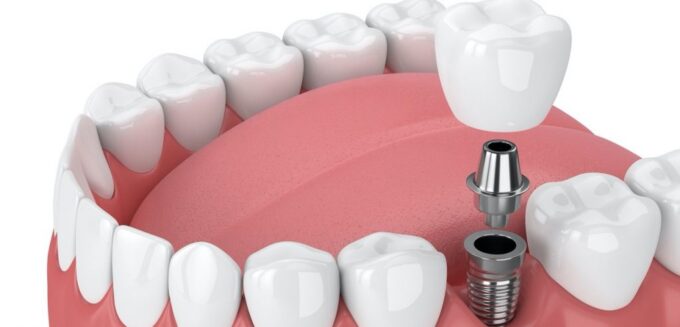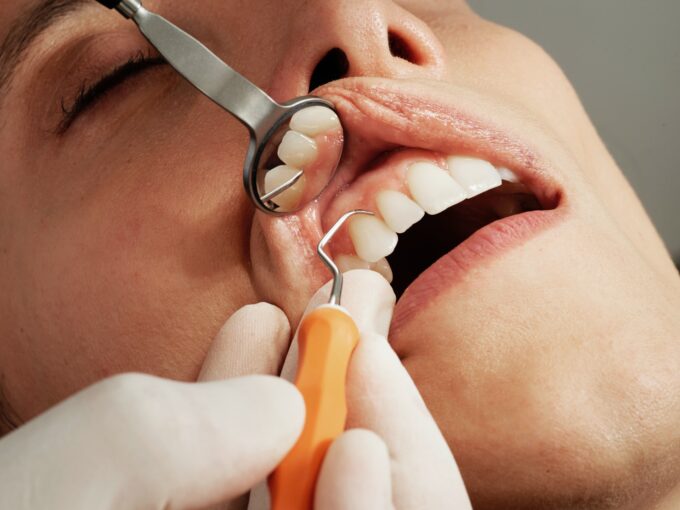An extremely traumatic experience can be the loss of one or more teeth. Tooth loss can lead not only to an aesthetically poor appearance, but can also create hygiene and other health problems. If this traumatic experience happens to you, don’t worry.
Dental implants are an ideal solution in such situations. This can be a very quick and easy installation if the 3D orthopteran shows that your jaw can handle it, or better said that you have enough jawbones. Dental implants can also be a solution for edentulous patients. But this kind of intervention requires a little more time.
If your jaw is healthy, and the dentist who intervened is professional, the dental implant will not be different from the other teeth. Any problem that seemed abnormal until then can become a thing of the past in just a day or two. No matter how many difficulties they will solve, patients often have a great fear of implant placement. Some are afraid of the sound of the instruments dentists work with, while the others are not immune to the specific smell dentist offices have. Still, most wonder whether installing implants hurts
In the following text, we will take you through the process of placing a dental implant, and hopefully show you that your fears are ungrounded. We answer the most frequently asked question: does the installation of a dental implant really hurt. Sit back, you’re not in a dentist’s chair yet, and find out what creates your nightmare.
What are dental implants?

Source: lifecaredental.com.au
Dental implants are a replacement for the root of one or more teeth. They are the culmination of advances in modern dentistry. It is a titanium tooth replacement. Over time, titanium grows from the bone in which it is laid. A lost tooth becomes functional again, allows you to eat, looks more beautiful, increases oral hygiene and, simply, increases the quality of everyday life.
According to mybridgwaterdentist.com, Implant placement is a permanent solution and not only in the aesthetic sense, but also helps in the process of bonding the entire jaw structure.
How does a dental implant work:

Source: batidentalclinic.com
How the implantation process itself will go and how long it will last depends on the apartment in which the patient’s jaw is located. If it is a jaw that has enough height and width the jawbone, the process will not take long and will last about a week. However, if there is a slightly different problem, the implant can be extended for a few months.
The implant placement process itself can be divided into several stages. At the very beginning, the doctor and the patient agree on all the details and the whole process. If everything is in the best order, the implant installation itself takes a very short time, a maximum of ten minutes. After preparing the jaw, the titanium screw with threads on it, must be screwed into the bearing. The bearing is located just below the gums. It is not visible to the human eye. It is an artificial tooth root. After that, a temporary crown is placed on this thread, which will allow you to function normally for a while.
However, if a 2D or 3D image shows that there are certain problems, the usual course of implant placement changes. The most common problems in patients occur in the sinus cavities. In such cases, a piece of bone is inserted into the sinus to expand the sinus cavity.
After placing the implant, ie the temporary crown, it would be desirable for the patient to come the next day to determine whether the bone has accepted or rejected the foreign body. If everything turns out to be in the best order, it takes at least 4 months to know for sure if the screw has grown. During this period, the dentist determines the color and shape of the implant from the patient’s opinion. When everything is decided, and the screw is well fused, an abutment is applied to the screw itself, which is in the shape of a thread, and a perfectly dimensioned and done implant will be attached to it.
Does this process hurt?

Source: unsplash.com
Dentists, although patients who have had this experience claim that the only thing you can feel in this whole process is a needle prick from anesthesia. During this intervention, you can hear various sounds: bushes, files, closing, however, the pain should not be felt. Patients say that this process is much easier than the process of tooth extraction. Local anesthesia allows you to be aware of the whole process, but without much discomfort. You should not feel any pain, especially if the tissue of your jaw is absolutely healthy. Regardless of the anesthesia, the bone in which the implant is placed does not have many nerves, so the absence of pain is expected.
If you are like me, one of those patients who are really nervous about visiting the dentist you can drink a mild sedative before the intervention.
Is there Pain after implantation?

Source: supremiadentistry.com
If pain occurs after implant placement, it should not be unbearable or worrying. Most often, it is not pain but a little discomfort. Discomfort is normal if it occurs in the chin area, in the chin or near the eyes. A majority of dentist will agree when we say that slight pain is normal and if it doesn’t pass a few days after the procedure, you consult your dentist.
Of course, your dentist may prescribe painkillers. If swelling occurs, you can apply ice packs, and hard foods should be avoided for a while.
As we have already mentioned in the text, implants are made of biocompatible material, so every healthy jaw should accept it. However, implants are not for everyone. The most important thing is that the overall condition of the patient is good. There are, it is true, a very small number of diseases that can prevent the implant from attaching to the jawbone. The biggest problem can be the space in the jaw bone that is not enough. However, modern dentistry has effectively solved this problem with the help of artificial bone implantation.
The most important thing is that the patient trusts and listens to his dentist and that he correctly maintains oral hygiene in a proper way. Implants require as much attention as natural teeth.







